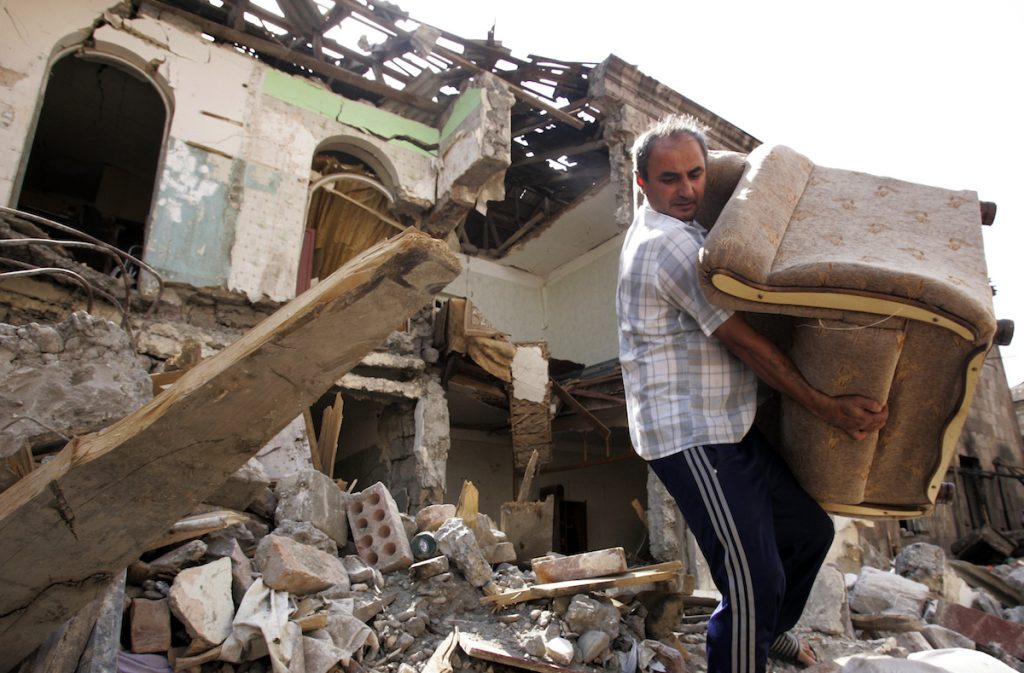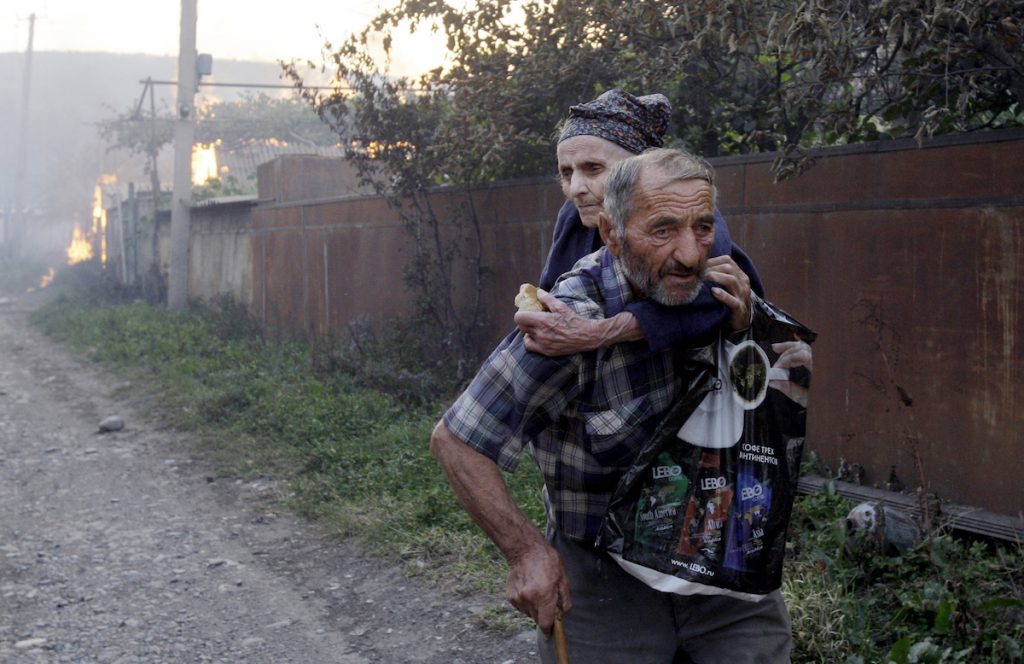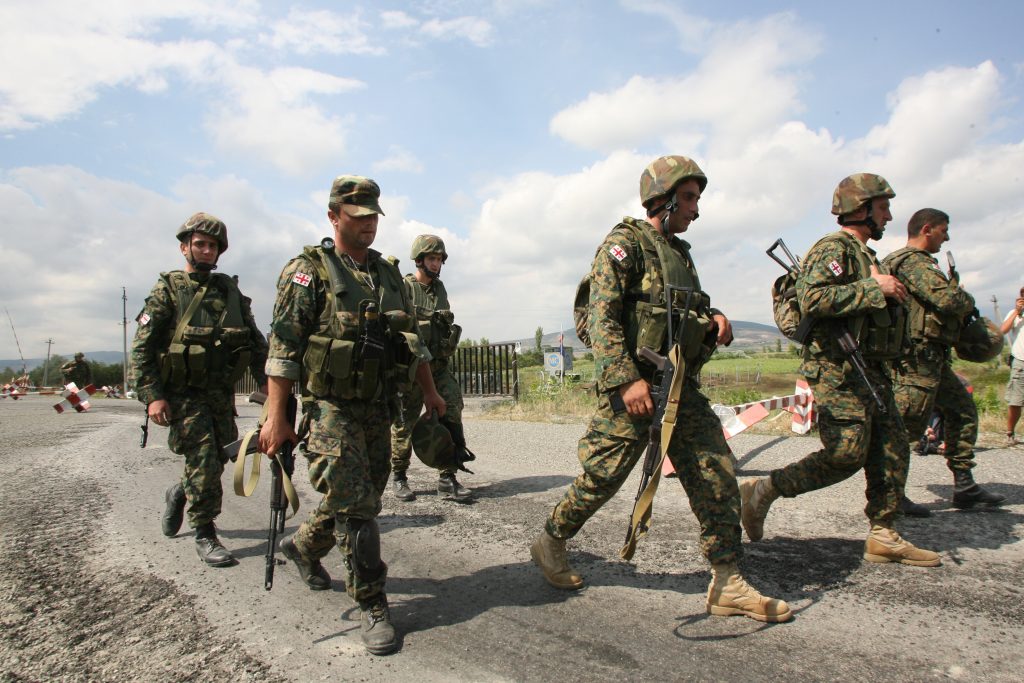Georgia v Russia in ECHR case continues
The European Court of Human Rights in Strasbourg has unequivocally ruled in favor of Georgia in the case of Georgia v. Russia in the August 2008 war, Georgian experts say, despite the fact that the court did not satisfy the entirety of Tbilisi’s suit.
The case is not over yet, as the court will still have to consider the issues of compensation to the injured party.
In addition, the court has not yet completed the consideration of private claims against Russia and Georgia by victims of the conflict.
The case continues
On January 21, the European Court of Human Rights ruled that Russia was responsible for violations of six articles of the European Convention on Human Rights of Georgian citizens, including violation of the right to life, torture and destruction of private property.
In Georgia, this decision was called a victory and a “historic document”.
- The 2008 war over South Ossetia: How it all happened
- How to build an Abkhaz-Georgian dialogue and should it be built at all – discussions in Abkhazia
On the Georgian-Ossetian conflict
The case “Georgia v. Russia” is connected with the war over South Ossetia in August 2008, in which Georgia and Russia participated. These events were called the August, or the five-day war.
Georgia lost 412 civilians and military personnel in the 2008 August War. The Ossetian side reported 365 military and civilian losses. According to official data from Russia, the war also claimed the lives of 67 Russian military personnel. Around 20,000 residents of Georgian villages on South Ossetian territory became refugees.
The August War of 2008 was the first war in Europe in the 21st century.
South Ossetia was an autonomous region within Georgia during the USSR.
The modern-day history of the Georgian-Ossetian conflict dates back to the fall of the Soviet Union at the end of the 1980s. South Ossetia wanted independence, and in response, Georgia abolished its status as an autonomous region and included the region into Shida Kartli.
The first armed confrontation and the first victims were reported in November-December 1989. Active military activity took place between 1991-1992 and ended in 1992 with the signing of the Dagomy agreement, which obliged both parties to cease fire and withdraw armed forces from the contact zone. The Russian Federation was also obliged to withdraw its military forces from the territory of South Ossetia.
Various sources report that during the period of armed conflict, up to 10,000 people died from all sides, and up to 100,000 people became refugees and displaced persons.
Until August 2008, the conflict was considered “frozen.”
After the 5-day war in August 2008, Russia recognized South Ossetia as an independent nation. Diplomatic ties between Moscow and Tbilisi were severed.
Most in the international community consider it a separatist region of Georgia.
“The decision concerns only the issue of the responsibility of the Russian side, but the principle of fair satisfaction has not yet been discussed at all,” Tina Burjaliani, former Deputy Minister of Justice of Georgia, one of the authors of the lawsuit, said in an interview with JAMnews.
According Burjaliani, after the decision is made, the court must consider the issue of satisfying Georgia as the injured party, and this does not mean only material compensation.
“I use this term deliberately and am not talking about compensation, because in the claim we emphasized that the fair satisfaction provided by the Convention in this case should be carried out in different ways.
If people’s rights can be restored, they must be restored to their original state. For example, this concerns the restriction of freedom of movement, restriction of the return of people to their homes.
Where there is no investigation and specific perpetrators must be brought to justice, this must happen, and where there can be nothing but compensation, the Russian Federation, of course, must pay compensation,” said Tina Burjaliani.
Once the decision is made, Burjaliani says, the procedure provides for an exchange of positions between the parties in writing – the Georgian state is given the opportunity to send a detailed request to Russia, to which the Russian side must give an answer. The court will then discuss the form of satisfaction.

What Georgia has achieved
Paata Zakareishvili, a conflict expert and the former state minister for reconciliation and civil equality, believes that this decision “has almost no drawbacks” for the Georgian side.
“Any decision of a high-level court has a political context. This is primarily because the court clearly and unequivocally confirmed that these are occupied territories. Nobody doubted this, there are resolutions of European institutions on this matter. But these are political resolutions with which you can agree or disagree. A court decision is a completely different matter.”
According to Zakareishvili, a court decision is a document that Georgia can use at any level to prove the fact of occupation, including in a UN court.
In addition, according to Zakareishvili, the court’s decision is important from the point of view of the policy of non-recognition, because “it will be difficult for many states to think about recognizing these territories.”
What Georgia has failed to achieve
According to Tina Burjaliani, during the preparation of the claim, there were expectations that the court would recognize Russia’s responsibility for violations committed during the hostilities.
According to her, the decision of the Strasbourg court in 2011 to accept the claim was the first assessment of the court, and according to this decision “Russia had jurisdictional obligations during this period in this territory, de jure in Georgia, and therefore the claim should be considered on the merits”.
Burdzhaliani said that in its final decision the court did not indicate that Russia was not responsible for the events of August 8-12.
“We are talking about hostilities, and the court here, unfortunately, says that it will not be able to assess this type of hostilities.
The first reason for this was called very complex factual circumstances, in which it is very difficult to define anything. And the second reason – the court was not ready to develop the existing precedent for the extraterritorial use of jurisdiction, that is, outside the territory of the state…
For this, the court was very strongly criticized, because it did not take on this responsibility. What does it mean? This means that a state can wage an international armed conflict on the territory of another state and do whatever it wants during a war, so as not to be held accountable in accordance with the convention,” Burjaliani says.
Paata Zakareishvili also considered these arguments of the court unconvincing.
“Many questions arise. I am ready to agree that from 8 to 12 August Russia could not fully exercise jurisdiction over these territories, there was also the Georgian army … But what to do with people who die at this time? The court at this time should say something, at least that maybe there was no full Russian jurisdiction, but there were people who died. “
In his opinion, in this way the Strasbourg court created a bad precedent even for considering future claims related to the Karabakh war.
According to Tina Burjaliani, there is still a possibility that the court will consider the violations that took place from August 8 to 12 during the consideration of individual claims. However, “this path will have to be followed carefully.”

Has the court identified the party responsible for starting the war?
According to Tina Burjaliani, the court approached this issue with caution.
“We see that, for example, the court’s decision fully cites the very same paragraph from Tagliavini’s report (the report of the EU fact-finding mission, which refers to the start of hostilities with the shelling of Tskhinvali by the Georgian side – JAMnews). But from a legal point of view, this is completely unimportant, and the court clearly speaks about this. It doesn’t matter for Georgia or Russia. He also states unequivocally that he cannot assess whether Russia used force legally or illegally, and that is not his business, ”Burjaliani says.
According to Paata Zakareishvili, “the topic of the outbreak of war is not discussed anywhere except Georgia. When elections or the next date of August 8 come, it becomes a matter of the internal political context, because the beginning of the war is not decisive. “
According to him, “nowhere is the outbreak of war as such a crime under modern international law.”
Will the court’s decision affect relations with the Abkhaz and Ossetian sides?
“I am afraid that the topic of relations with the Abkhaz and Ossetian communities will not suffer because of this good document. I think that in the joy of the fact that Russia is to blame for everything, we may not see the interests of the Abkhaz and Ossetian society behind this document, ”Paata Zakareishvili believes.
“We can speak very toughly with Russia using this document. But we cannot talk as toughly with our citizens – Abkhazians and Ossetians, ”Zakareishvili said.
According to him, “this document is a tool that can be used incorrectly, and if we speak with the Abkhaz and Ossetians from the position of our conflict with Russia, this will alienate them from us even more.”
Individual claims
After considering the lawsuit “Georgia v. Russia”, the European Court will consider the claims of citizens affected by the war.
These are the claims of the citizens of Georgia against Russia, as well as the claims of the Ossetians living in the Tskhinvali region against Georgia.
According to Tina Burjaliani, most of the claims filed by Russian lawyers on behalf of the Ossetians were unfounded, and the court could not accept them for consideration.
“But there are also so-called show cases. If the claims of the plaintiffs are proved in these cases, then the court may recognize a violation of the norms of the Convention by Georgia. “
She expects that the publication of the decisions on these cases will begin in a few months.



















